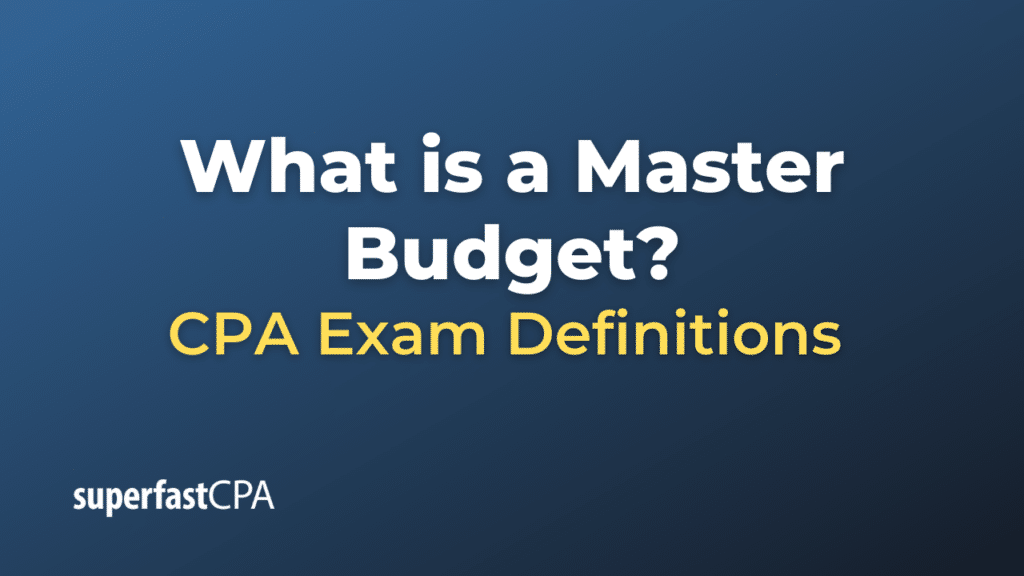Master Budget
A master budget is a comprehensive financial planning document that includes all of the lower-level budgets within an organization, along with cash flow forecasts, budgeted financial statements, and a financial plan. It represents a company’s overall financial blueprint for the upcoming budgeting period, typically a fiscal year.
The master budget consists of two main components: the operating budget and the financial budget.
- Operating Budget: This part includes budgets that make up the day-to-day operations of the business. It includes many sub-budgets such as:
- Sales Budget: An estimation of future sales, often broken down into both units and dollars.
- Production Budget: Details the number of units that must be produced to meet sales needs and inventory requirements.
- Direct Materials Budget: Shows the amount of materials the company must purchase to fulfill the production budget.
- Direct Labor Budget: Displays the amount of labor hours required to meet the production budget.
- Overhead Budget: Projects all overhead costs for the budget period.
- Selling and Administrative Expense Budget: A plan for non-manufacturing costs.
- Budgeted Income Statement: The culmination of all operating budgets, summarizing the operational activity in a standard income statement format.
- Financial Budget: This part focuses on how the actions and outcomes from the operating budget will impact the company financially. It includes:
- Capital Expenditures Budget: Outlines the company’s plans for purchasing long-term assets.
- Cash Budget: A detailed plan showing how the business expects cash to flow in and out during the budget period.
- Budgeted Balance Sheet: A projected balance sheet showing the company’s financial position at the end of the budget period.
- Budgeted Statement of Cash Flows: Outlines how the company anticipates money will flow in and out of the business.
By consolidating all of its individual budgets, a company can ensure that all of its divisions and departments are working toward the same financial and operational goals. The master budget process also allows for adjustments and alterations if certain budgets or goals become unrealistic or outdated.
Example of a Master Budget
Let’s consider a hypothetical company, “ABC Manufacturing,” and how it might put together a simplified master budget for the upcoming fiscal year.
- Operating Budget:
- Sales Budget: ABC Manufacturing projects that it will sell 10,000 units of its product at a price of $50 per unit. That’s a total of $500,000 in sales revenue.
- Production Budget: To meet this sales goal and keep some inventory on hand, the company plans to manufacture 11,000 units.
- Direct Materials Budget : Each unit requires $10 of materials, so the company will need to budget $110,000 for direct materials (11,000 units x $10).
- Direct Labor Budget: Each unit requires 2 hours of labor at $15 per hour. So, the labor budget will be $330,000 (11,000 units x 2 hours/unit x $15/hour).
- Overhead Budget: The company has fixed overhead costs (like rent and utilities) of $100,000, plus variable overhead costs of $5 per unit. So, total overhead costs will be $155,000 ($100,000 fixed + $55,000 variable for 11,000 units).
- Selling and Administrative Expense Budget: The company expects to incur $50,000 in selling expenses and $40,000 in administrative expenses.
- Budgeted Income Statement: This would be compiled from the aforementioned budgets.
- Financial Budget:
- Capital Expenditures Budget: ABC Manufacturing plans to purchase a new piece of machinery for $200,000.
- Cash Budget: This would detail expected cash inflows from sales and any other income, and cash outflows from direct materials, labor, overhead costs, selling and administrative expenses, and capital expenditures.
- Budgeted Balance Sheet: This would provide a snapshot of ABC Manufacturing’s expected financial position at the end of the fiscal year.
- Budgeted Statement of Cash Flows: This would provide a summary of how cash is expected to flow in and out of ABC Manufacturing during the fiscal year.
Each of these individual budgets contributes to the master budget, providing a comprehensive overview of ABC Manufacturing’s financial and operational plans for the upcoming fiscal year. This way, the company can ensure all departments are aligned and working toward the same objectives.













